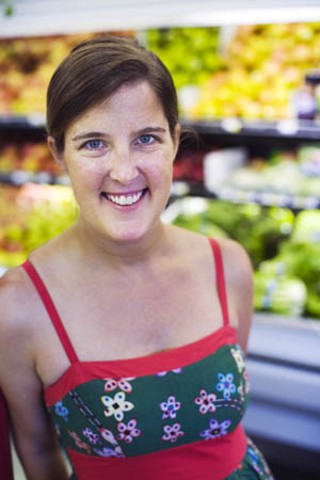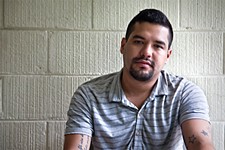'Forgive Me: A Novel'
An excerpt
By Amanda Eyre Ward, Fri., June 15, 2007

Chapter 13
Nadine met Maxim on her first day in the Nutthall Road house. After she dropped her backpack in what would be her bedroom, Nadine sat at the kitchen table and shared an afternoon beer with George. George was writing all day, but his words, he said, weren't adding up to much of a novel. He was clearly jealous of Maxim, whose photographs were selling well. Maxim, George told Nadine, worked his ass off, driving his car into the townships and documenting the bloody battles there. Blacks were attacking blacks, blacks were attacking whites, and Maxim was making a name for himself, signing with a prestigious agency and garnering paid assignments for newspapers and magazines. George looked wistful as he described his successful roommate.
"And Thola?" asked Nadine. "How did the two of you meet?"
George grinned. "It's a long story."
The beer was cold in Nadine's mouth. She hadn't spoken to anyone in a week. "So go on and tell it," she said, relaxing into her chair.
"I was ten years old when I first saw her," said George. "Her leotard was the color of orange sherbet."
"Very dramatic," said Nadine. "I'm guessing you've told this story before?"
"Be quiet, you," said George.
The program was called Dance for All, and it was one of the few ways a child could get out of the townships. "They hold auditions every year," said George. "Kids come barefoot, hungry, whatever. Kevin Holderman, Thola's teacher, he chooses the ones with talent, and he trains them. One of Thola's classmates is in the London Ballet."
"Fantastic," said Nadine, smelling a Lifestyles feature.
"So Thola came to San Francisco," said George.
"In an orange leotard," said Nadine.
"My mother took me to the ballet," said George, ignoring Nadine. "I fell in love with her by the end of the first dance. That night, I lay under my Batman bedspread and dreamed she was in the top bunk. In the morning, I begged my mother to find her and invite her to lunch."
"What's your mother like?"
"Rich, confused, beautiful. Anyway, she found out that Tholakele was staying in the Stanford dorms. She thought my crush on a little African girl was adorable, at first."
"Is she still alive?"
"What? Who?"
"Your mother," said Nadine.
"Of course she is," said George. "Will you zip it and listen?"
Thola arrived late. She wore a starched dress and plastic jelly sandals. She told George her teachers had made her wear the stupid dress. She much preferred jeans, she said, and she was going to be a Freedom Fighter.
Ten-year-old George fidgeted behind his plate of ham sandwiches. Thola hadn't turned out to be the quiet ballerina he had imagined. He wasn't sure what a Freedom Fighter was, and he didn't know what to say. His strategy of impressing Thola with his collection of butterfly wings seemed increasingly ill-conceived.
"These little sandwiches are fab," said Thola, who had put away four already and was slathering mayonnaise on a fifth. George watched the way expressions came and went quickly on her face: enthusiasm, anger, delight. She took a bite and sat back in her chair, one arm across her chest and the other holding her food aloft. "So, George," said Thola, "I hear you love me."
George's heart hammered in his chest. This was not going according to plan. He could feel his palms and his armpits grow damp. "I ...," he said.
"It's okay, man, no worries," said Thola. "You're not the only one, let's leave it at that."
"Oh," said George. His food sat in front of him on his plate. He never wanted to eat again.
"I don't have time for boys," said Thola. "My cousin Albert's in the MK. I want to be in the MK, too. But I'm only nine, so I must wait. There are more important things than boys, you know?"
"I thought," said George. "I thought you wanted to be a ballerina."
"Dancing's okay," said Thola. "I love to dance. And I can go places. Here I am in America! It's great, but I miss my mom. Someday I'll go back to dancing. When my country is free, I will be a ballerina. It will happen, you know, whitey."
George was speechless, completely flummoxed. Was there a chance for a hug? He looked at her brown arms, and imagined them around his shoulders. Did she wear perfume? He couldn't tell from across the table. He wanted to get one milkshake with two straws. Then they could both sip at the same time, as George had seen in movies.
"What are you staring at, boy?" said Thola. "Don't look so unbelieving." She finished off her sandwich and leaned across the table. Her face was very close to George's. Was she going to kiss him? George looked into Thola's brown eyes. Thola opened her mouth and sang joyfully, "Free Nelson Mandela!"
"Did you have any idea what she was talking about?" said Nadine, opening two more cans of beer.
"Fuck no," said George. "But she did kiss me after lunch. She tasted like Reddi wip."
"Whipped cream?"

"We'd had banana splits for dessert," said George. He shook his head. "She ate most of mine."
Nadine laughed.
"I wanted to stay in touch. She gave me Kevin's address. I wrote her for months."
"Did she write back?"
"Not for a long time. The company went to L.A., New York, Boston. I started researching South Africa at the library. Can you imagine? There I was, this sheltered kid from Pacific Heights, learning about apartheid. I'd never really understood how ... how big the world was, how horrible and exhilarating. It blew my mind."
"It was the same for me. I grew up in a tiny town on Cape Cod. When I was twelve, we went to Boston for the St. Patrick's Day parade and I thought I had died and gone to heaven. I mean, people looked so different. I heard other languages for the first time. And people were talking about ... fucking foreign policy! Well, not at the parade." Nadine smiled, remembering a dim pub called the Black Rose, where she overheard two students arguing about bombings in Northern Ireland while her father tried to order her a Coke. "Woods Hole," she said. "They talk about clamming and boats. They don't want to know what's going on off-Cape."
"Something to be said for that," said George. "A simple life."
"I guess. But it isn't for me."
"I hear you," said George, and they tapped their cans together, a toast. George sat back and studied Nadine. Nadine touched her neck. "Back to the story," she said.
"Right," said George. "Right. So I started researching South Africa. I finally found a Newsweek article explaining what Thola had meant by 'MK.'"
"You were ten, reading about the MK?"
"Wild, huh? I read that they sent kids to Mozambique and Angola for military training, and I was hopeful, but I saw on my light-up globe that neither spot was near the Bay Area."
"No," said Nadine, laughing.
"I read that the MK were given guns and hand grenades, taught how to fight and then sent back into South Africa. The idea of Thola as armed and dangerous only made her more attractive, of course."
"Of course," said Nadine, thinking of Sammy again, the biker whose tattoos and bad attitude had been his best characteristics.
"I went around singing the ANC anthem, which I'd found on a Time Life cassette of world music. I still remember it. Nkosi Sikelee ... ."
Nadine winced at his off-key rendition. "I get the picture," she said.
"At this point, my mother no longer thought my crush was so cute. She did not appreciate my singing African songs, and she threw away my FREE MANDELA T-shirt. She said it was the nanny, but I knew better."
"What about Thola?" said Nadine. "Did she ever write back?"
"Not until I was in seventh grade."
"What did the letter say?"
George put out his cigarette. "I have it," he said. "You can see for yourself." He went into his bedroom, returned with a time-worn piece of paper.
"You saved it, all these years?" Nadine asked.
George shrugged, gave the paper to her.
Hola George,
Thank you seven times for seven letters. I am very happy to have them. I am very busy with school and dance, of course, but I do think about you and about your nice mlungu home in America. My cousin (Albert) is home you will be glad to know. Things are not good and happy here, but we have faith. During the day there is fighting in the streets, nyaga nyaga, which means trouble, as I am sure you appreciate. The area around my house and in my house is safe for now. Two friends are dead, and I sing for them and I pray for them. They have not died for nothing.
In school, we are learning about white man history and also science. At ballet school I am becoming a master of the jete and Albert teaches me the toyi-toyi. You should see me. Do not worry that I will fall in love with a Freedom Fighter, George. I told you before and tell you once more I do not have time for such things. When there is a free South Africa you will hear from me. You can write again and tell me more about this Alcatraz. Also, how did the San Francisco Ballet Gala Benefit of your mother go? I hope well. Send prayers for me and for you I will do the same. My sister Evelina says hello and she would like to come to America. Unfortunately, she is clumsy, and can never be a ballerina.
Nkosi Sikelel iAfrika,
THOLA
(The Lion)
"This was what – fifteen years ago?" said Nadine.
"Right," said George, taking the letter back and folding it carefully.
Nadine leaned forward. "How did you reconnect?"
"I wrote to her all through high school; and then during college, I finally saved enough to come over. Kevin set me up with this apartment about a year ago. Maxim was headed to Bucharest, and wanted to make some extra money by renting out rooms."
Nadine nodded and sipped her beer. "Go on," she said. ![]()
Excerpted from Forgive Me by Amanda Eyre Ward. Copyright © 2007 by Amanda Eyre Ward. Reprinted by arrangement with the Random House Publishing Group.








